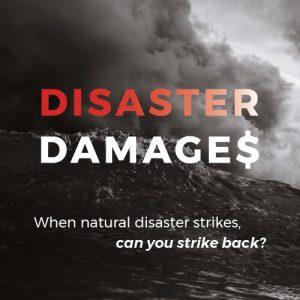
Natural disasters may seem far away and unlikely to affect you, but these unexpected events can take many forms and happen far more often than many people realize. When an act of God occurs, people often lose their homes and possessions. They may also be injured, out of work, permanently displaced, and unsure where to turn.
So the question is: when disaster strikes, can you strike back? The truth is, it depends. In some cases, you may be able to file an insurance claim, sue a liable party, or take a tax write-off. An attorney can help you understand your options and deal with complex legal claims.
What Is an “Act of God?”
As the Legal Information Institute (LII) defines, an act of God as “an overwhelming event caused exclusively by natural forces whose effects could not possibly be prevented.”
Many in the Gulf South suffered damages due to Hurricane Katrina, and, more recently, some experienced flooding and wind damage from Hurricane Ida. Both of these are examples of acts of God. So are other natural disasters, such as:
- Floods
- Earthquakes
- Tornadoes
- Sinkholes
- Landslides
Otherwise known as an “act of nature,” sometimes these events or their effects are worsened by the actions of individuals, companies, or government agencies.

For a free legal consultation, call 800-537-8185
Can You Sue for an Act of God?
Suing after a natural disaster can be tricky. Even if you suffered damages through no fault of your own, there may not be anyone to hold responsible. However, this does not mean you should assume there is no legal path to financial recovery. To file a lawsuit, you must have evidence that someone else caused or contributed to your damages—or at least failed to prevent them.
One recent example occurred when a boat owner failed to secure their vessel properly. When hurricane-force winds knocked the boat loose, it slammed into others. Because the owner’s actions played a role in the damage, the insurance companies refused to consider it an act of God. As such, the other boat owners had to pursue damages in a civil case against the negligent owner.
The legal issues surrounding these cases can be complex and involve difficult questions of negligence and liability. An attorney can help you identify your legal options, find the liable party, and negotiate with their insurance provider to recover compensation based on your losses. In some cases, a lawsuit may be necessary.
Having Insurance doesn’t Always Mean You Have Coverage
If the cause of the natural disaster truly was an act of God beyond what anyone could control, your only financial recovery options are likely:
- Federal Emergency Management Agency (FEMA) assistance
- You personal insurance coverage
Unfortunately, some insurers won’t cover damages caused by an act of God. Every policy is written differently, and each one can include or exclude various claims based on the circumstances. This is true whether the policy covers bodily injuries or your home, vehicle, or other assets.
For example, most homeowners’ insurance policies do not cover flooding. If your home flooded because of the storm surge and you did not have a separate flood insurance policy, you might be out of luck. However, if your roof sustained damage and this caused your home to flood, you could receive coverage.
FEMA Often Provides Disaster Relief for Significant Acts of God
It’s generally advisable to carry plenty of insurance should something go wrong, but sometimes hindsight is 20/20. If you are in a federally-recognized disaster area, FEMA disaster relief will likely be available. However, this agency only provides compensation to repair things that are the direct result of a disaster, and only that will make the house “safe and sanitary” again.
Filing and proving these claims can be complex and may require an appeal if the agency denies you initially. Still, FEMA often provides crucial assistance to families and individuals who do not have insurance coverage or need funds quickly to make repairs.
Click to contact our personal injury lawyers today
You Will Likely Qualify for a Tax Break
Regardless of whether insurance covers your losses or you can hold someone else responsible, you will likely be eligible for a tax break if you suffered damages due to a natural disaster. It is always a good idea to seek professional tax advice from an accountant.
Generally, you will be able to write off losses caused by a federally-recognized disaster if you don’t recover those damages through insurance or a lawsuit. Otherwise known as the “casualty loss deduction,” this write-off considers the amount of the loss, anything you recovered, and your gross income.
You can deduct the value calculated from your income when you file your federal income taxes. A tax professional can walk you through your options.
What to Do If You Sustained Damages in a Natural Disaster
Immediately following the disaster, you should make sure you and your family are safe. Once you’ve met your basic survival needs, your next step is to take an inventory of what was lost or destroyed. This process could take some time, especially if you evacuated and cannot yet return home.
Taking this inventory is crucial. Not only will this help you make a claim down the road, but it will also identify the things you need to replace right away. For example, these include prescriptions and important documents, such as social security cards and identification.
Next, you should contact your insurance company to discuss what they need to begin a claim. You may also want to speak with an attorney to determine if you have a case, especially if there is evidence that another party’s actions contributed to your damages.
Speak to a Team Member from Morris Bart, LLC for Free
Connect with the Morris Bart law firm today to learn how one of our personal injury lawyers can seek and secure compensation for your injuries or property damages. The areas we serve cover much of the Gulf South, including Louisiana, Mississippi, Alabama, and Arkansas.
Call (800) 537-8185 now to reach our team.
Questions?Call 800-537-8185
to find a Morris Bart office near you.





